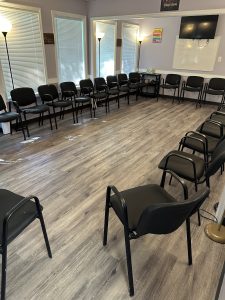Competency 2: Advance Human Rights and Social, Racial, Economic, and Environmental Justice
Introduction:
As a competent social worker, I will strive to be culturally aware, and advocate for social justice changes. Additionally, I will use self-evaluations to examine any preconceived notions and/or biases I may have when working with diverse populations. I will use evidence-based practices when I am advocating for social justice changes as well as human rights, racial, economic, and environmental justice. This will be accomplished by completing holistic assessments with clientele.
2A – Demonstrate leadership in developing and implementing evidence-based practice with relevant strategies that advance human rights at the individual, family, group, organizational, community, research, and policy levels.
Course Evidence: For For SOCW 618: Advanced Administrative Practice: Administration and Leadership, I worked with a group to create an organization proposal for a non-profit in the greater Chattanooga area called Foster Parent Care Network. Please see FPCN Organization Proposal Final Paper for additional details.
Field Evidence: For one of my special projects, I attempted to create an East TN Mental Health Work Group by incorporating mental health professionals and local, state, federal law enforcement to collaborate on policies and procedures in their respective areas. However due to systemic barriers, it went from a project implementation to project proposal. More information can be found under Special Project 1 link at the top.
2B – Implement culturally informed strategies with diverse populations.
Course Evidence: For SOCW 618: Advanced Administrative Practice: Administration and Leadership, please see FPCN Organization Proposal Final Paper section Human Resources Plan (2.7) for additional details.
Field Evidence: I worked with individuals at the hospital that had various traumas as well as mental health needs. During my time at Valley’s IOP program in Cleveland, I worked primarily with the drug court group participants. Below are pictures of the rooms where we would hold group and individual therapy sessions with the Drug Court Participants. Due to confidentiality, there are no clients present in the photos. I implemented culturally informed strategies that dealt with addiction and substance abuse treatment to help them complete the drug court program and obtain sober living.


Knowledge: I used knowledge from my experience working with diverse clients at Department of Children’s Services for almost the past 10 years. Relying on this experience, greatly helped me bridge the barrier of working with individuals that have substance and mental health issues.
Skills: Active listening, communication skills, empathy, and critical thinking were all skills used during this competency. Active listening, communication, and empathy were vital in establishing trust among the patients. This was important to do during my special project, as the staff were very interested in having a self-care policy implemented and reducing their secondary and vicarious trauma they’ve experienced while on the job.
Values: The values demonstrated were the importance of human relationships and the dignity and worth of a person. Regardless of a person’s socioeconomic status, cultural difference, mental health conditions, or addiction issues, I wanted them to feel respected, and I wanted them to feel confident in voicing their thoughts during the individual and group sessions as well as during group discussion in the psycho education classes I taught.
Cognitive: The cognitive processes used were knowledge, comprehension, and application. For the knowledge piece, I used what I had learned in past academia/training, current academic curriculum, and job experiences to meet the needs of my clientele. I utilized comprehension when learning new information, and in turn, I interpreted the information into my practice which led to the application. I exemplified these cognitions throughout my field placement by bringing forth ideas such as Critical incident debriefs to help staff with their on the job secondary and vicarious trauma.
Affective: The affective processes used were receiving and value. I was aware of my client’s feelings and experiences in the past, which was crucial in moving our relationship forward and proposing interventions. Value was also critical, as had I not shown the client respect and acknowledged their beliefs, they would not have trusted me or worked with me as well as they did.
Theoretical Foundation:
I chose Social Learning theory for this competency as it states that addiction can be learned through observation, reinforcement, and modeling of behavior. Individuals may develop addiction by observing others’ substance use and experiencing positive reinforcement or relief from negative emotions. This theory also can be used in a positive manner in supporting mental health staff with self-care techniques and policy to reduce secondary and vicarious trauma.